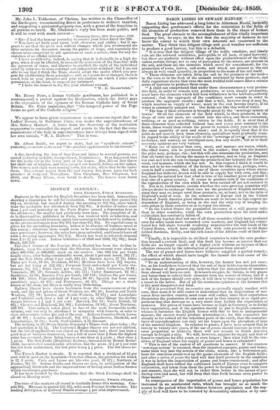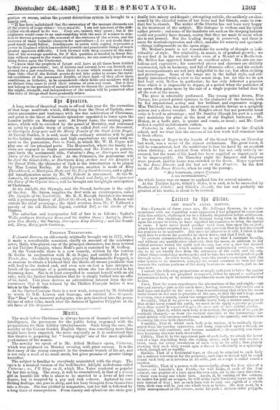BARON LIEBIG ON SEWAGE MANUftg.' n .1 " Baron Liebig has addressed
a long letter to Alderman Mechi;1 supporting that gentleman's efforts for the restoration to the a of
the elements of production removed from them in the shape of human food. The great obstacle to the accomplishment of this vitally important economy lies, he says, in the fact that the majority of farmers do not know the extent to whith their own interests are concerned in the matter. They think that diligent tillage and good weather are sufficient to produce a good harvest, but this is a delusion. It is true that the diligent tillage of the fields, sunshine, and timely rain are the outward eonditions, perceptible to all -men, of geed harvests; but these are perfectly without effect upon the productiveness of the field, unless certain things, not so easy of perception by the senses, are present in the soil, and these are the elements whichserve for nourishment, for the production of roots, leaves, and seeds, and which are present in the soil always in very small quantity, in proportion to the mass of the soil itself. " These elements are taken from the soil in the products of the field— in the corn or in the flesh of the animals nourished by these products, and daily experience shows that even the most fruitful field ceases after a certain series of harvests to produce these crops. " A child can comprehend that under these circumstances a very produc-
tive field, in order to remain very productive, or even simply produotive, must have the elements which had been withdrawn in the harvests perfectly restored ; that the aggregate of the conditions must remain in order to produce the aggregate results ; and that a well, however deep it may be, which receives no supply of water, must in the end become empty, if its water is constantly pumped out. Our fields are like this well of water.
" The loss of these elements is brought about by the sewerage system of towns.' Of all the elements of the field which, in their products, in the shape of corn and meat, are carried into the cities, and there consumed, nothing, or as good as nothing, return to the fields. It is clear that if these elements were collected without loss, and every year restored to the fields, these would then retain the power to furnish every year to the cities the same quantity of corn and meat ; and it is equally clear that if the fields do not receive back these elements, agriculture must gradually cease. In regard to the utility of the avails of the ' sewerage of towee ' as manures, no farmer, and scarcely an intelligent man, has any doubt ;'but as to their necessity opinions are very various. " Many are of opinion that corn, meat, and manure are wares, which, like other wares, can be purchased in the market ; that with the demand the price may, perhaps, rise; but this will also stimulate the production, and that all turns upon having the means to purchase, and so long as England has coal and iron she can exchange the products of her industry for the corn, meat, and manure, which she has not. In this respect I think it would be wise not to be too confident of the future, for the time may, perhaps, come, even in half a century, that not one of those countries upon whose excess England has hitherto drawn will be able to supply her with corn, and that,' too, from the natural law that what is true of the smallest piece of ground is true also of a great country. It ceases to produce corn if the conditions of the reproduction of the corn which has been carried off are not restored to it. Nor is it, furthermore, certain whether the corn-growing countries will always desire to exchange their corn for the products of English industry, since they may no longer need these products, or, at least, not in the ratio of England's need of corn. In the countries of Europe and in the United States of North America great efforts are made to become in this zespect in- dependent of England, as being in the end the only way of keeping the corn prices in these counties so as to repay the labour. " In the United States the population increases at a still greater ratio than in other countries, while the corn production upon the land under cultivation has constantly fallen of. " History teaches that not one of all those countries which have produced corn for other lands have remained corn markets, and England has contri- buted her full share towards rendering unproductive the best lands of the United States, which have supplied her with corn precisely as old Rome robbed Sardinia, Sicily, and the rich lands of the African coast of their fer- tility. " Finally, it is impossible in Civilized countries to raise the corn produc- tion beyond a certain limit, aud this limit has become so narrow that our fields are no longer capable of a higher 3 ield without an increase of their effective elements by the introduction of manures from abroad." The use of guano and bones have hitherto supplied a partial remedy, the effect of which should have taught the farmer the real cause of the exhaustion of his fields.
"To an understanding of this, however, the farmer has not yet come, for, as his forefathers believed that the soil of their fields was inexhaustible, so the farmer of the present day believes that the introduction of manures from abroad will have no end. It is much simpler, he thinks, to buy guano and bones than to collect their elements from the sewers of towns, and if a lack of the former should ever arise, it will then be time enough to think of a resort to the hater. But of all the erroneous opinions of the farmers this is the most dangerous and fatal.
"If it is perceived that no country can perpetually supply another with
corn, then must it be still easier to understand that an importation of ma- nures from another country must cease still earlier, since their exportation diminishes the production of corn and meat in that country in so rapid pro- portions that this decrease in a very short time forbids the exportation of manures. The prices of bones have become so high in Germany as to forbid their exportation, and if the question should be put to English commerce, whence it furnishes the English hirmer with this to him so indispensable manure, the answer would produce astonishment ; for this commerce has already so far robbed all the inhabited parts of the earth, that the manufac- turer of superphosphate can only set his hopes upon the phosphate of lime of the mineral kingdom. In relation to guano, I have been assured that in twenty to twenty-five years, if the use of guano should increase iu even the same proportion as hitherto, there will not remain in South America enough to freight a ship. We will, however, suppose its supply and that of bones to continue for fifty years, or even longer ; then what will be the con- dition of England when the supply of guano and bones is exhausted ?
" This is one of the easiest of all questions to answer. if the common sewerage system' is retained, then the imported manures, guano and bones, make their way into the sewers of the cities, which, like a bottomless pit, have for centuries swallowed up the guano elements of the English fields; and after a series of years the land will find itself precisely in the condition it was in before the importation of guano and bones commenced ; and after England shall have robbed the cultivated lands of Europe even to complete exhaustion, and taken from them the power to furnish her longer with oorn and manure, then she will not be richer than before in the means of pro- ducing corn and meat, but will from that time forth become even poorer in these means."
In consequence of the importation of guano and bones population has increased in an accelerated ratio, which has brought us so much the nearer to the period when the balance between population and the sup- ply of food will have to be restored by devastating calamities or by gration en masse, nukes the present deleterioua system be brought to a timely end, .
" It has been maintained that the recovering of the manure elements out of the sewers of large cities i•,icinrectueinle. I am not ignorant of the ditti-
read i
ies we:eh stand in its was . They are, indeed, very great ; but if the engineers would come to an understanding with the men of science in rela- tion to the two purposes—the removal of the contents of the sewers, and the recovery of their valuable elements for agriculture—I do not doubt that a good result would follow. Intelligence in union with capital represents a power in England which has rendered possible and practicable things of much greater apparent difficulty. I look forward with deep concern-to the solu- tion of the sewerage question, for if this question is decided in Great Bri- tain without regard to the wants of agriculture, we can scarcely hope for any thing better upon the Continent.
"I know that the prophets of future evil have at all times been derided by their own generation ; but, if history and natural laws can furnish any ground for a just conclusion, then there is none which stands more firmly than this—that if the British people do not take pains to secure the natu- ral conditions of the permanent fertility of their land—if they allow these conditions, as hitherto, to be squandered—their fields and meadows will at no distant time cease to yield their returns of corn and meat. But it does not belong to the province of natural science to discuss the question whether the might, strength, and independence of the nation will be preserved after this state of things shall have gradually arisen.































 Previous page
Previous page